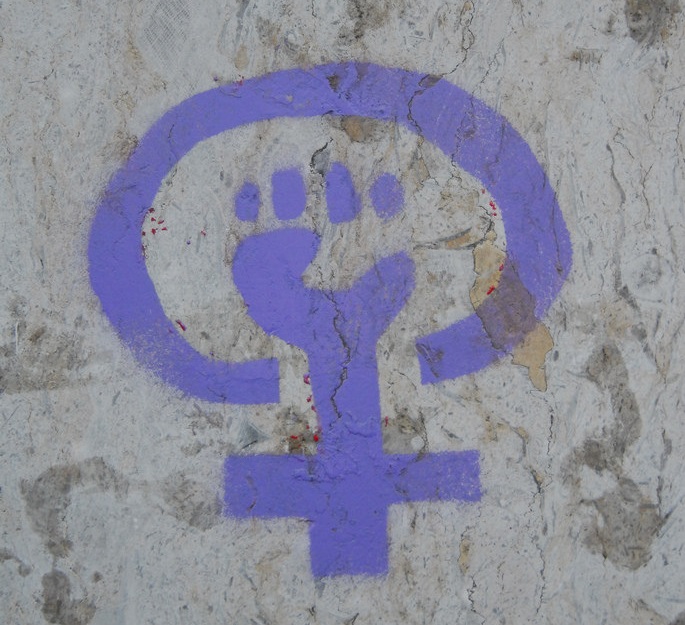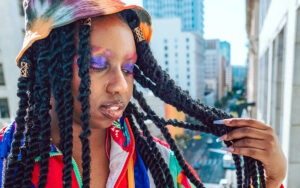
I ended Part 1 of this multipart column with two stories that I shared during the commencement address at Lincoln School back in 2004. Here are two more stories that I told during that address.
Story #3: Dear Abby—a woman as president
Back in 2004, I quoted from a letter to the advice columnist, Abigail “Dear Abby” Van Buren:
I am a 13-year-old girl in the 8th grade. For a class, I had to do an oral report about my future career.
I have wanted to be president of the U.S. since 5th grade. But when I said that, my teacher laughed and said I had little chance of making it. He didn’t say why. Then another student started laughing and said girls aren’t allowed to be president.
What a sad testament!
In the United States, women’s suffrage (the right to vote) began at a protest meeting in Seneca Falls, New York, July 1848. Guess who joined with Elizabeth Cady Stanton, the meeting organizer? Frederick Douglass, ex-slave and abolitionist.
Just trying to get the vote.
See HBO’s 2004 production Iron Jawed Angels. And now we have a new movie, Suffragettes, talking about the right to vote.
The women’s movement of my youth—the ’70s—hoped for a woman president in twenty years. In 2004, more than thirty years after the ’70s, a girl is laughed at by her male teacher and her classmates.
Do you think it’s better now? Check out just some of the research on the treatment of women in political campaigns.
(By the way, there are women presidents/premiers and heads of state in other countries around the world—and there have been for decades. What’s going on in the United States?)
Story #4: Rosa Parks
On December 1st, 1955, Rosa Parks got on a crowded bus to go home after work. Mrs. Parks joined the black men and women who were occupying the rear seats, designated for people of color. Eventually, a white passenger boarded the bus, and as the white section was full, the driver told Mrs. Parks to give up her seat and stand. That was the law.
When Rosa Parks refused to move, she was arrested and jailed.
The local women’s political organization distributed a leaflet urging “every Negro” to stay off the buses in protest of the arrest and trial.
The black folks of Montgomery Alabama boycotted buses for 381 days—including through a bitterly cold winter.
And on November 13, 1956, segregation of buses was declared unconstitutional by the U.S. Supreme Court.
That’s the power that started with one action—the choice of one person, a woman. The power of one.
Sign up for our free newsletters
Subscribe to NPQ's newsletters to have our top stories delivered directly to your inbox.
By signing up, you agree to our privacy policy and terms of use, and to receive messages from NPQ and our partners.
So what’s happening a decade or so later? Trayvon Martin. Eric Garner. A new movement, Black Lives Matter. I’m sad and disgusted and embarrassed that we must continue on this path.
Each of these stories is about social injustice—in particular, racism and sexism
Of course, we now have marriage equality because of the 2015 decision by the U.S. Supreme Court. That’s great. But that isn’t lived justice. Just ask our friends and colleagues and citizens who aren’t white. We had the Civil Rights movement. Now we have the Black Lives Matter Movement, because people of color aren’t living justice.
The stories go on and on.
Back in 2004, I said, “Never think that racism, homophobia, classism, etc. are NOT women’s issues. All these issues—racism, homophibia, classism, gender bias—intersect. Any human rights issue is a woman’s issue because no one is free until everyone is free.”
So the challenge to each of us is: Will we acknowledge the barriers to social justice and share in the work of removing these barriers? Will we exercise the power of one?
And will we exercise the power of community? Will we individuals gather together and push even harder? The Marriage Equality Movement did that. The Black Lives Matter movement is doing that. The women’s movement is lagging a bit, I think. Let’s kick-start it harder again.
I say that again in 2016. The stories go on and on. Never think that racism, homophobia, classism are not women’s issues. All these issues are connected. That’s called intersectionality.
And never say that the community—including nonprofits—has no voice in the tragedy of injustice
Just read the articles in NPQ.
Just look at the reviews of nonprofits and their boards and their staff.
Just look at the inadequate wages in so many nonprofits.
And shame on us all—look at the focus on major gifts from people with lots of money, instead of paying attention to democratizing philanthropy, too.
In 2004, I said to the graduating class, “You give me hope”
And I hope, twelve years later, that those women are speaking out. Because I believe that silence is consent. I hope that those women have helped to nurture feminist men throughout communities near and far. I hope those women are raising feminist children, girls and boys.
I hope those women work in nonprofits and for-profits—and in government. And I hope those women fight for justice and speak out against injustice.
But I don’t feel very hopeful today. Check out these two amazing pieces: Sady Doyle’s “Progressive” and Caitlin Moran’s “Things About Being a Woman That Women Won’t Tell You.”
I’ll end now. There’s one more part to this column. Until next time.













